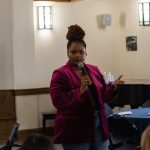BY CHRISTOPHER BULFINCH ’18
SENIOR EDITOR
Ned Lamont, a candidate running for 2018 Governor of Connecticut, visited Trinity on Tuesday, Apr. 27 to speak with a group of students and faculty about issues relating to climate change and environmental protection legislation in Connecticut. The Common Hour lunch, hosted by the Greenberg Center for the Study of Religion in Public Life, provided Mr. Lamont with the opportunity to connect to and hear from young voters and the Trinity community concerning policies that seek to combat climate change.
Mr. Lamont, a Democrat who ran unsuccessfully for the United States Senate in 2006 and was defeated in 2010 for the Governor’s seat by Dannell Malloy, is running a campaign focused on his commitment to improve Connecticut’s ailing economy. He is a proponent of a $15.00 minimum wage, the reconstruction of Connecticut’s infrastructure, and tightening gun control laws. His stance on environmental issues and combating climate change, however, is somewhat less clear.
Mr. Lamont was invited to the Greenberg Center for one of the Center’s “Climate Change Plus” meetings, a weekly luncheon among students, faculty, and the Greenberg Center’s staff, hosted by Director of the Greenberg Center and Professor of Religion in Public Life Mark Silk. Previous guests have included some of Trinity’s administrators as well as faculty. The lunches seek to examine the dangers posed by climate change and to discuss potential political solutions, especially at the state level, to help address the crisis. Further, the meetings focus on the moral dimension to the problem as well, especially with respect to the role of an institution like Trinity.
Mr. Lamont’s participation in last Tuesday’s Common Hour discussion was an opportunity to articulate his vision about the role of climate change in Connecticut’s future and how best to reduce the state’s contribution to the problem. Mr. Lamont opted to listen more than to speak, asking the students and faculty assembled in the Greenberg Center what their views are as students and academics and how they would consider combating climate change.
Students and faculty in attendance reflected on the immediate threat of climate change and Trinity’s role, as both an institution and a member of Connecticut’s community, in the crisis. Mr. Lamont, for his part, listened and offered suggestions about initiatives that his administration would undertake to reduce Connecticut’s carbon footprint and prepare the state to confront the physical challenges posed by climate change. Mr. Lamont also added that his administration would commit itself to environmental issues.
Parker Fiske ’18, who is a member of Climate Change Plus, told the Tripod, “the Lamont campaign showed a real commitment to listening to the college generation on the issue of climate change by coming to Climate Change Plus.”
Mr. Lamont had to leave the luncheon early because of his busy schedule. The participants continued discussing Mr. Lamont’s proposals and Trinity’s own engagement with climate change, considering the importance of addressing climate initiatives on campus in the future.
Tuesday, January 14 2025
The Student Newspaper at Trinity College in Hartford, Connecticut





+ There are no comments
Add yours